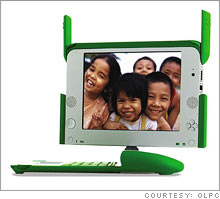Exclusive: Negroponte on his Intel triumphNick Negroponte explains to Fortune's David Kirkpatrick how his effort to give poor children laptops took a giant leap by making peace with longtime nemesis Intel.NEW YORK (Fortune) -- It's been an eventful two weeks for the $100 laptop movement. On July 13 the group called One Laptop Per Child (OLPC) announced it would add Intel to its growing list of corporate supporters, which include Intel's chip rival AMD as well as Google, News Corp., eBay, Quanta Computer and others. Then on the 23rd OLPC said that the XO, its triumphantly-engineered computer (which will actually initially cost closer to $200 than $100) will go into mass production at Quanta in Taiwan. For Nick Negroponte, who as this initiative's hyperkinetic leader has turned it into a force beyond all predictions, both announcements were triumphs. He talked with me for the first time this week about how it happened and what it all means. Intel, particularly via its Chairman Craig Barrett, has in the past been quite critical of the XO and and Negroponte's ideas for how it should be used. As recently as May, when 60 Minutes aired a segment on OLPC, Negroponte was firing back with even more venom. But Negroponte's brother John, a foreign policy veteran who now serves as deputy secretary of state, watched the show and got upset. Says Negroponte: "He advised me that people were going to get bored very quickly with this fight, which seemed, from his point of view, completely unnecessary. He said that in his opinion we should make peace." Negroponte had already gotten similar advice from both Apple (Charts, Fortune 500) CEO Steve Jobs and Google (Charts, Fortune 500) CEO Eric Schmidt, and he finally decided to take it. It apparently didn't take long to create concord. But while the deal has been portrayed as merely an effort by Intel (Charts, Fortune 500) to replace AMD's chips as the brains of the XO, it turns out there is much more to the deal. For one thing, Intel will not abandon its up-to-now competitive effort to sell a different kind of laptop for poor kids it calls the Classmate. This machine, while more conventional in appearance and conception, has great potential in many parts of the developing world. Unlike the XO, it may not be completely dust- and water-proof and suitable for use under the most trying conditions. Nor is it quite so energy efficient. However there are many places in poor countries which have power and where kids have roofs. OLPC has up to now said it will only take orders of a million machines at a time from governments. Negroponte now says the orders from here on will almost certainly be for a mix of the two types of computers. It's possible OLPC may end up selling a family of machines. But Intel's Classmate is likely to get radically better. OLPC has come up with some tremendous innovations, including a low-power screen that is readable in sunlight, extremely clever collaboration features, and well-designed ways to get multiple computers to connect to one another in what's called a "mesh" network, making it possible to share Internet access across a wide area. (An impressed reviewer at eWeek said this week that "the XO is one of the most revolutionary computer systems that I've seen in some time.") All that, as well as the stunning physical design of the XO, will now be available to Intel to incorporate into the Classmate, if it so chooses. "We're giving them all our technology," Negroponte says. If and how this will happen will take many months to figure out, of course. "The most important thing now is that the Classmate and the XO will become harmonious," he continues. "They will interoperate and serve different parts of the market. It will be a cooperative strategy. We're a single camp now." I spoke to him by phone as he navigated security at Reagan National Airport in Washington. He was in Washington meeting with, among others, officials in the State Department and USAID. Now that Intel is part of the OLPC effort, officials both in the United States and elsewhere are more willing to meet and talk turkey with Negroponte. In the United States there is now less worry about potential conflicts of interest given his brother's exalted governmental status. For another, customers don't have to worry as much about satisfying often-rigorous government multiple bidding fairness rules. Intel was non-profit OLPC's main competitor. The reception to the Intel news in the many developing countries where Negroponte has been indefatigably promoting his computer was "nothing short of euphoria," he says. "A number of government officials e-mailed me to say 'My god this makes my job easier.'" Almost all the countries have been agonizingly trying to decide between the two computers and the very different approaches that the companies have up to now represented. OLPC has focused heavily on empowering children with tools they can use in and out of the classroom, while Intel has been much more oriented towards providing tools for teachers to use with kids in school. "The two approaches can work together easily," Negroponte insists. That of course remains to be seen. But there is suddenly more maturity on both sides. For both OLPC and Intel, getting together to jointly market their two computers bespeaks a more resolute approach toward the real goal - putting useful computers into the hands of the world's poor children. Even AMD (Charts, Fortune 500) professes to be pleased Intel has joined the campaign, and Negroponte insists the two chipmakers will be able to work together. I would love to see it, but I really was born in Missouri, so I'll wait to see. But the Intel news combined with the manufacturing launch shows this project really is going somewhere. Negroponte says the first transfer of money - meaning a firm order - should happen next week, with either Peru or Panama. |
Sponsors
| |||||||||||

